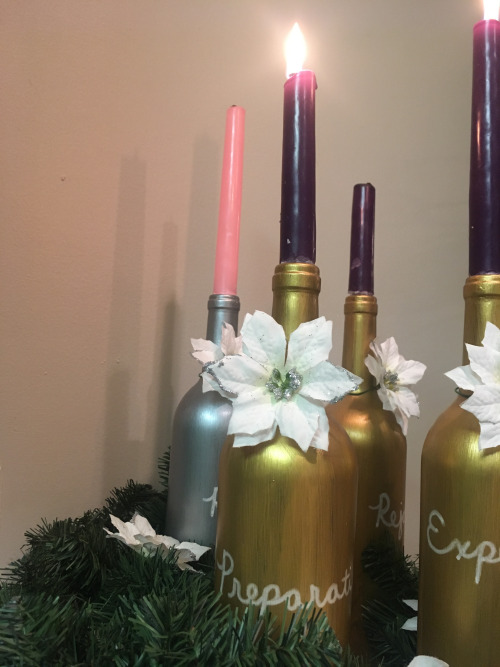
Last week I outlined my lowered expectations for the upcoming Advent season. Going along with the theme I picked last year for my wreath, this week’s topic is preparation.
The thing about expectations is that the only thing you can do with them is prepare. You can prepare for the worst, you can prepare for the best, or you can prepare for the party, but all you can do in the light of expectations is prepare for the event that yields them. And now that we have our expectations outlined and admitted, we can prepare for them.
This week I’ve spent a lot of time preparing for the holidays. I’ve been making and purchasing things for Christmas, and making other preparations for upcoming festivities. Today I realized that I actually bought “brush on glitter” instead of glittery paint. So that’s a thing that exists in my life now.
It’s easy for me to prepare physically. I have a race next weekend? I will run. I have a party to attend? I will make a dessert. But mentally? Or even spiritually? Much harder. My mind says “work work work work work” like Rihanna will never leave my head, but this can be a dangerous trap. These are man-made preparations that mean a little in the short term but close to nothing in the long run. How do I make meaningful preparations for the season? I can’t keep fooling myself that “putting up” the tree is one of those. There needs to be something more. But what?
How do you really, truly prepare for Christmas? I suppose we must first look at what Christmas really is. Is it a commercially controlled holiday designed to make us buy presents? Is it a good excuse to go shopping? Is it truly when the Son of God comes to Earth? Or is it something else?
Regardless if you believe the story of Jesus’ birth, picture the famous scene at the manger. At the foot of a baby’s bed gather shepherds and kings, animals and innkeepers, carpenters and angels. How humbling that these groups would put aside their differences and come to where animals sleep to celebrate the miracle of life.
Humility. This is a topic that I’ve written about before, and that always seems to come up. [There’s probably a reason.]
I think sometimes after Lent and Easter, we slowly work ourselves back to a position of pride and honor in our self-centered worlds. We spend a few weeks contemplating what the salvation of mankind means and what it looks like to sacrifice something, then we gorge on chocolate eggs and summer begins. [At least, this is how my seasons seem to go.] By the time Advent rolls around, I’m back at my cynical peak, disappointed by worldly events and afraid of what man can do.
Yet here we are, in a season that, at the heart of its lore, celebrates the birth of a baby. Consider babies for a moment: everything stops for a baby. Our breath gets caught as we contemplate the tiny fingers and toes, and there may be no greater joy than when a parent hears her child giggle for the first time. Whether we like them or not, babies take our full attention, and before you know it, you’re bending over backwards to make sure the baby stays happy.
Ten pounds of helpless, poopy human can do that to us. That’s either embarrassing or humbling.
As we spend time here in the second week of waiting-for-Christmas, perhaps it would do us some good to reflect on those feelings. At its core, Christmas is not a time of giving, or receiving, or rum filled eggnog; it’s a time of love. And while yes, it is important to have a certain level of self-love, I am talking about the sacrificial, self-giving love. You know, the hard kind. The kind you want to make conditional but can’t. The kind that you give a baby, and that you should give to everyone.
Our Advent preparations should probably look something like this kind of love. Sometimes this means doing something, sometimes it doesn’t, but we all know exactly where it needs to happen in our lives.